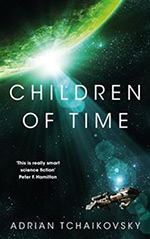
![]() couchtomoon
couchtomoon
9/11/2016
![]()
It really is just about the spiders, isn't it?
Definitely the most Arthur C. Clarke-ian of this year's shortlist, with its progressivism tinted by flat human characters and a darting to-and-fro starship, this is exactly the kind of book I would expect to see on a shortlist named after the only interesting writer of "The Big Three." Children of Time is a well-done generation starship tale about uplift, First Contact, and the best I've read when it comes to animal-pomorphized aliens, though it might be the only version of Alien Space Bat writing where the humans are more fatally drawn than the aliens. The nature doc-style spider strands in the early chapters steal the show over the stale human characters in the space opera strand, making it an odd fit in British SF where human concerns usually tend take precedence over (or at least rate alongside) gizmo porn and alien shoot-em-ups.
It's the kind of book I can't help but rearrange structurally in my head, though, the most obvious alteration being to cut out most--if not the entire--human strand. Although I suspect Tchaikovsky is going for a mirroring of events in the two strands to highlight our shared existence as human and arachnid, the human arc of the tale adds unnecessary bulk, the jumps in human time to match that of spider evolution are jarring and unconvincing, and, frankly, the human adventures are just plain boring (and recycled BSG at times, which is probably recycled something else I haven't read). Besides, the human presence isn't necessary to remind us that the spiders' progress is much like that of human (Western) progress, which emerged and thrives on the work of stolen civilizations. In fact, the entire metaphorical subplot of spider progress mirroring exactly that of Western civ--while I get what Tchaikovsky wants to do--feels blunt and contrived.
But to cut out most of the human arc leaves us with just a 250-page story (plus!) about the evolution of Alien Space Spiders (minus) (but done so well!).
Another kind of restructuring might also improve the reception of the tale: There are a couple of moments of true, palpable horror-- both when the two species meet, once on the ground of Kern's World and once in the final space combat scene-- both of which vividly raises the stakes of the story. Perhaps these scenes could be better utilized as flash-forwards, escalating tension at earlier points while leading the reader to succumb to base instincts of spider fear. Then, with the steady evolution and progress of the spider story to fill in the gaps between those flash forwards, this would push the reader into an unwilling, then willing, recognition of the humanity of this new species (and the brutality of our own). It would be a more engaging and active experience for the reader, rather than the passive tale of cultural evolution that we see here.
But I'll give it to Tchaikovsky that when those strands of vivid spiders and boring humans finally converge, it becomes apparent that the 2-D characterization of the human characters might be intentional. Because it really is just about the spiders. If that's the case, this is one SF story I won't diss for neglecting the human element; Tchaikovsky is after something different here and succeeds... boring though it may be half the time.
http://couchtomoon.wordpress.com